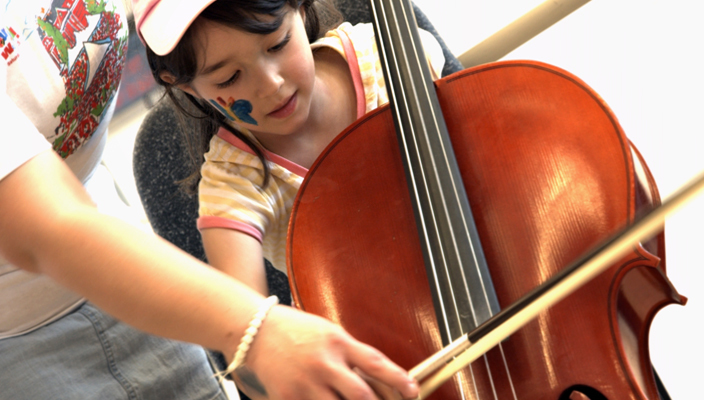There has been much written on the benefits of music lessons for children. One of the most obvious benefits is that music helps develop creativity.
Another lesser known advantage is that it helps children with mathematics. Several studies published in
Scientific American have shown that learning to play music stimulates the same areas of the brain that are used in mathematical processing. By building those neural pathways through music, your child can access them easily again later when doing math. Researchers also found that musical training activated the region of the cerebral cortex used in auditory processing, so if your child is one of the many with an auditory processing disorder, music lessons can help improve this.
In addition, skills that govern reasoning, verbal memory and reading skills are largely enhanced when a child engages in musical training. With all of this fascinating research to prove the numerous perks of music lessons, it is no wonder that parents are anxious to get their children started. However, before you hastily enlist your child in instrumental boot camp, you’ll need to make sure he is ready.
Age Isn’t Always Just a Number
While there are some age stipulations with certain instruments, it is not always cut and dry when it comes to knowing if your child is ready to learn music. Regardless of the benefits, music lessons can be expensive and time consuming. Before you shell out the money for lessons, be sure your child is capable of learning and enjoying music, and that the lessons won’t become a source of frustration.
There are some developmental milestones that should be reached before attempting to learn to play an instrument, and not all children hit these marks at the same time. First, observe whether the child knows her right from her left. She should also be able to recognize her letters, and preferably be able to read. Some fine motor skills are necessary as well. To test for these, have your child wiggle each finger independently. Not all children can do these things, even by the age of nine when most schools begin to offer instrumental lessons. If your child needs help in one of these areas, put off the lessons and work on mastering the basic skills first.
Test Basic Skills
To test if your child has some basic musical abilities, clap to a rhythm and see if your child can repeat the same rhythm back to you. Also, play different notes and see if your child can tell you which are higher and lower. Recognizing patterns in sounds and rhythms and being able to differentiate between frequencies in tones are two signs that your child is ready to learn music.
Next, observe your child’s attention span. Can he sit still and listen for 30 to 45 minutes at a time? Also, ensure that he knows what music lessons actually entail, and that he understands that learning will take time and repetition. Be certain he is aware that he will not be pounding out Beethoven or playing rock and roll guitar riffs within the first few lessons.
After you have ensured he has the skills necessary for playing an instrument, you’ll want to ask the obvious questions. Namely, ask him questions like “Do you really want this,” “How much do you want this,” and “What are you willing to do to have it?”
While that line of questioning may seem rather intense, the bottom line is that your child is not going to learn much if he is not really interested in the lessons he is taking. Also, to get the most out of the training, he is going to have to practice. You should ask him up front if he is willing to do so. Learning music takes self-discipline and commitment, in addition to the other skills that were mentioned. Arguably, the willingness to learn and to put forth the effort required can often make up for any lack of skill. Asking these questions can help you find if your child has what it takes to get the most out of his musical instruction.
Consider His Schedule
Before signing your child up for lessons, you’ll also want to take a good, long look at your child’s schedule. Ensure that he has the time for both his lessons and practice. If he already has sports five days per week and a couple of hours of homework every night, it may not be the optimal time to start instrumental lessons. Although parents often worry about their children not learning everything, sometimes it is better to have them learn one thing well rather than having a child that is so tired and overwhelmed that he is unable to grasp anything at all.
If you decide to put music lessons off for a year or two, it doesn’t mean he won’t be successful in his musical pursuits. There are many successful musicians who did not start lessons exceptionally early, and some who even started rather late in life. There is no “missing the boat” when it comes to learning an instrument. You can jump in and get started at any time. That being said, if your child is ready and willing, you may find that music lessons greatly enhance every aspect of his life.
Header Image : Credit : Steve Snodgrass

